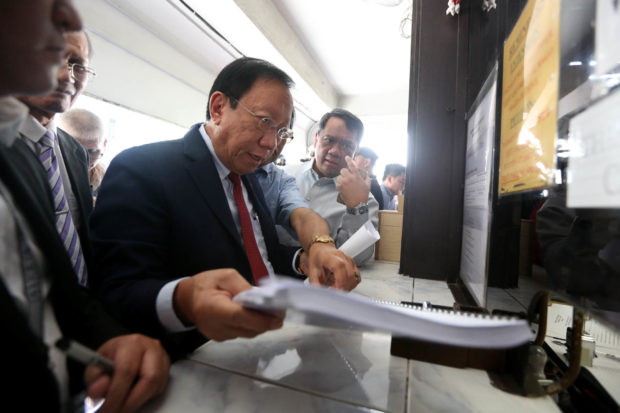
QUO WARRANTO PETITION Solicitor General Jose Calida questions the validity of Maria Lourdes Sereno’s appointment as Chief Justice in the quo warranto petition he filed in the Supreme Court on Monday. —MARIANNE BERMUDEZ
Solicitor General Jose Calida did what Speaker Pantaleon Alvarez suggested a week ago — bring the fight against Chief Justice Maria Lourdes Sereno to the Supreme Court.
Calida filed a quo warranto petition in the Supreme Court on Monday to seek Sereno’s ouster as Chief Justice on the grounds that she was unlawfully holding the position and that she did not prove her integrity as an applicant for the judiciary’s top post.
“We are asking [Sereno], ‘By what authority is she holding the position of Chief Justice?’ She violated the constitutional requirements for eligibility,” he told reporters.
Calida likened the quo warranto petition to “an act of kindness from a lawyer to respondent Sereno.”
“I don’t want her to suffer the ignominy of what the late Chief Justice Renato Corona suffered at the hands of politicians who judged him unfairly,” he said.
Corona, Sereno’s predecessor, was unseated in May 2012 after he was found guilty by the Senate impeachment court of failure to disclose his real wealth in his statement of assets, liabilities and net worth (SALN)—a similar allegation being thrown at Sereno.
Sereno is also accused of betrayal of public trust, violation of the Constitution and graft and corruption.
Then 52, Sereno was appointed by then President Benigno Aquino III in 2012 as Chief Justice, much to the chagrin of senior magistrates on the Supreme Court, most of whom were appointees of former President Gloria Macapagal-Arroyo.
Charter provision
Citing Section 7(3), Article VIII of the Charter, Calida argued that Sereno had failed to comply with the requirements set by the Judicial and Bar Council (JBC), including the mandatory submission of SALNs.
“By submitting SALNs less than those required by the JBC of other applicants for Chief Justice and without lawful justification for her noncompliance, [Sereno] was unable to prove her integrity,” Calida said.
He said Sereno filed her SALN only in 1998, 2002 and 2006 during her 20 years as a faculty member of the University of the Philippines College of Law.
In urging the tribunal to nullify Sereno’s designation, Calida said Sereno was a “de facto public officer who can be ousted through a quo warranto proceeding.”
“[Sereno] is a de facto public officer whose appointment is void ab initio (from the start),” he argued. “A de facto public officer is one who acts under a color of authority, unlike a mere usurper or one who has neither title nor color of right of an office.”
‘Devoid of basis’
Sereno’s camp played down Calida’s legal tactic, insisting that the petition was “devoid of basis” and the Supreme Court should jettison it.
“The best act of kindness to the Chief Justice is to transmit to the Senate the articles of impeachment expeditiously,” lawyer Jojo Lacanilao, one of the Chief Justice’s spokespersons, said in a statement.
Calida parried insinuations that the petition was proof that the impeachment complaint pursued by President Duterte’s allies against the Chief Justice was weak.
“This is, in fact, a proof of the strength of the state to oust Sereno from her office,” Calida said. He added that resolving issues regarding Sereno’s authority would be faster through a quo warranto petition than impeachment proceedings.
“It’s up to the justices now. I’ve done my duty as solicitor general,” he said.
Calida filed the petition barely a week after 13 magistrates forced Sereno to take an indefinite leave amid the controversies surrounding her impeachment.
Interestingly, Calida filed the petition despite the fact that it went beyond the one-year prescription period in resolving such legal dispute as spelled out in Section 11 of Rule 66 of the Rules of Court.
“The state is not bound by prescription. Secondly, we will reckon it from the date of discovery [of the offense in December 2017],” he said.
In a press conference at his office in Makati City, Calida cited precedents of impeachable officers—including former Commission on Audit Chair Reynaldo Villar in 2012 and then Commission on Elections Chair Vicente de Vera in 1949—who were removed from their posts after a quo warranto had been filed in the high court.
A senior court official said the justices had included Calida’s petition in their weekly full-court session today.
Presidential spokesperson Harry Roque said Malacañang had no preference as to how the allegations against Sereno should be resolved—whether through an impeachment trial or an “unprecedented” petition voiding her appointment as Chief Justice.
There is a need to study the move taken by Calida because the process of quo warranto is vague, according to Senate President Aquilino Pimentel III.
Senate Minority Leader Franklin Drilon said the high court should tackle the petition given that it was the “final arbiter of constitutional issues” but added that the justices would be treading on a “slippery slope.”
Sen. Francis Escudero said Calida’s move was a “novel theory” but was “standing on shaky ground at best.” —With reports from Leila B. Salaverria and Christine O. Avendaño